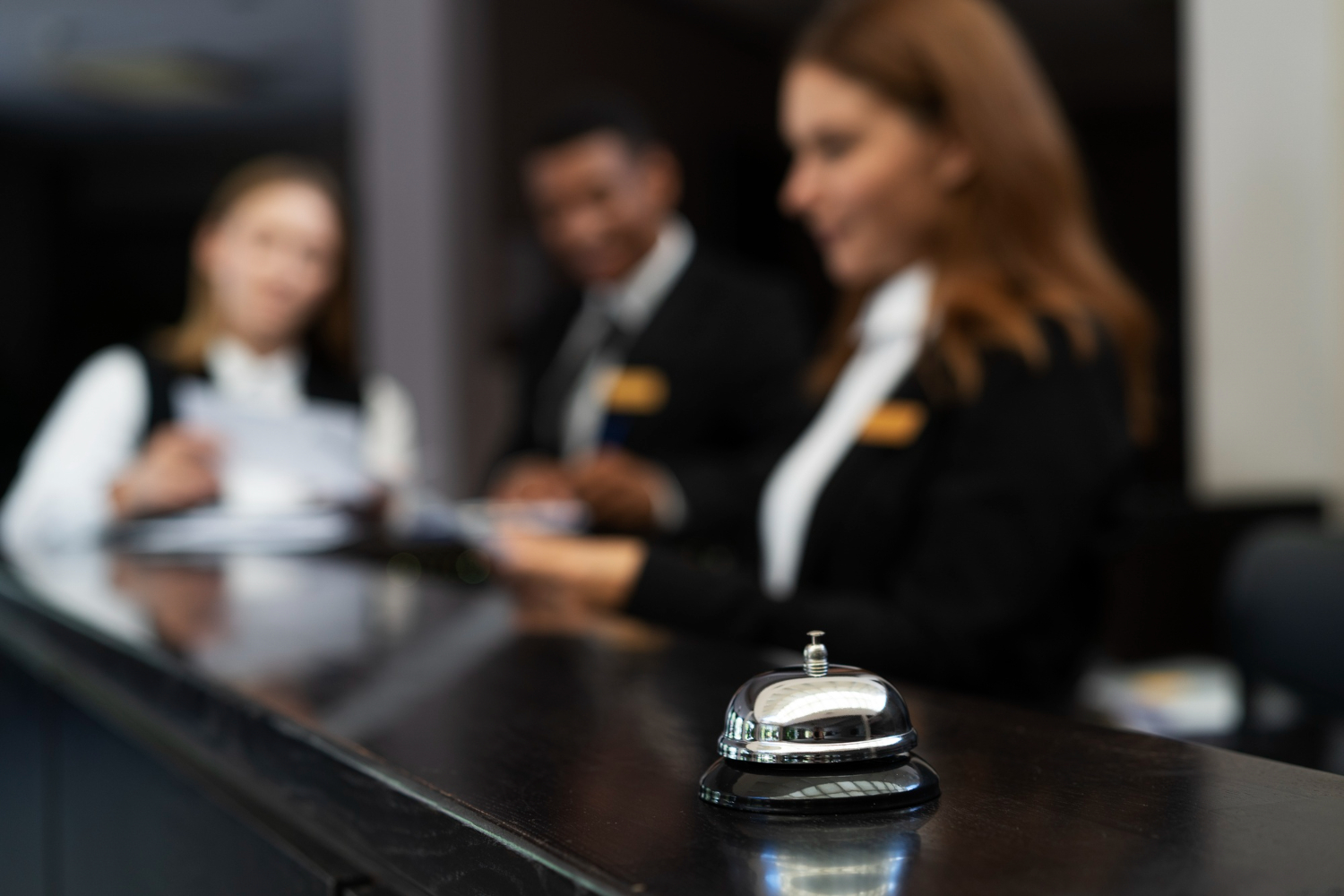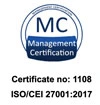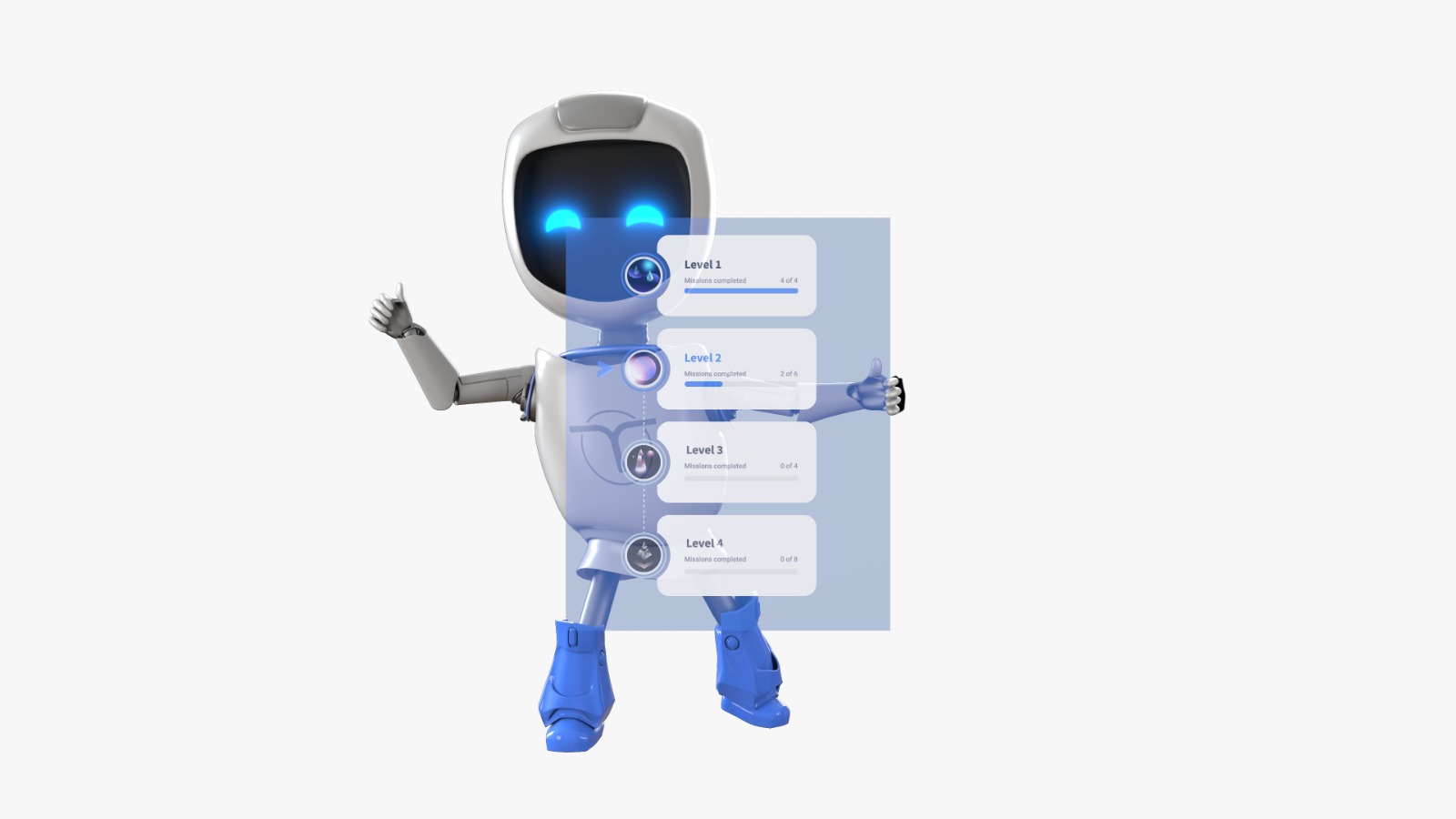The hotel industry is facing significant staffing shortages, according to the American Hotel & Lodging Association. 65% of hotels are short-staffed, and 71% have open roles they can’t fill. On average, each property is missing six to seven employees, most often in housekeeping (38%), front desk (26%), or kitchen roles (14%). In this environment, hotel staff training can help teams handle the extra workload while keeping service standards high.
In fact, LinkedIn Learning research shows that the right training can improve employee performance by up to 25%, which can make a noticeable difference in day-to-day operations.
This article explores the main challenges of training hotel staff, the core skills every employee should develop, and the most effective training methods.
The Challenges of Training Hotel Staff
When creating a training plan for hotel employees, handing over a manual and sending them straight to work won’t prepare staff for the job. The hospitality presents the following obstacles that training should account for:
- Constant guest interaction – often in stressful or emotionally charged situations
- Handling sensitive information – including cash, personal belongings, and credit card data
- Exposure to physical hazards – such as fires, theft, or guest-related incidents
- Serving diverse guests – navigating language and cultural barriers
- Heavy workloads – especially during peak seasons or when understaffed
- High turnover – making it harder to maintain consistent service standards
- Limited onboarding time – leaving new hires unprepared from day one
Because of these factors, hotel staff training must go beyond basic procedures. It should:
- Prepare employees for real situations
- Develop critical skills
- Be delivered in formats they can absorb quickly.
Core Skills Every Hotel Employee Should Master
The best hotel teams combine technical knowledge with strong interpersonal skills. These core abilities apply across departments and directly influence guest satisfaction.
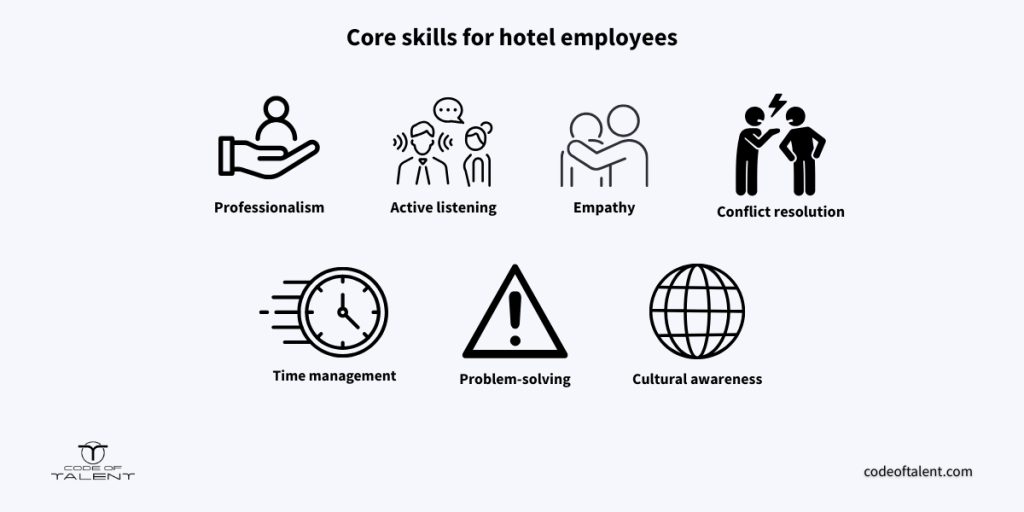
1. Professionalism
According to SiteMinder, 78% of travelers rank great quality service as the number one factor when choosing a hotel. Professionalism is an umbrella term that covers many essential hospitality skills and is often the main focus of training programs. Here’s a bullet list of what professionalism covers in a hotel setting:
- Punctuality
- Consistent attendance
- Well-groomed appearance – following the hotel’s uniform and grooming standards)
- Polite and respectful communication – with both guests and colleagues
- Positive body language – maintaining eye contact, smiling, and open posture
- Adhering to service protocols
- Confidentiality
- Calm under pressure
- Accountability – admitting mistakes and working to correct them
- Team cooperation
- Attention to detail
- Consistency – delivering the same level of service to every guest, every time
- Professional boundaries – keeping interactions friendly but appropriate
- Representing the brand – acting in a way that reflects the hotel’s values and image
2. Active Listening
Active listening means giving guests full attention and confirming their requests. This prevents misunderstandings and shows guests their needs are taken seriously.
Tips to listen actively:
- Maintain eye contact and nod occasionally
- Avoid interrupting when someone is speaking
- Repeat or paraphrase key points to confirm understanding
- Ask open-ended questions for more detailed responses
- Take notes to avoid forgetting details
3. Empathy
Stressful situations always come up in a hotel setting for guests, even though they are on holiday. Booking issues, unmet expectations, jet lag, accommodating to a new culture or climate, just to name a few.
Understanding where they come from and responding with empathy can turn a potentially negative experience into a positive memory. This is why it’s important for hotel staff to show empathy, a skill that is hard to train if not done correctly.
Tips to show empathy:
- Put yourself in the guest’s shoes
- Use empathetic phrases like “I understand how that could be frustrating”
- Practice patience, especially when guests are upset or anxious
- Pay attention to nonverbal cues
- Follow up with guests after resolving issues
4. Conflict Resolution
Disputes over bookings, billing, or noise complaints are inevitable in hotels. Even staff can have heated moments that escalate into conflicts, which may harm team dynamics over time.
Training should include de-escalation techniques and solution-focused strategies to keep situations under control and help prevent issues from escalating into legal disputes.
Tips to avoid conflict:
- Stay calm and avoid taking complaints personally
- Listen fully before responding to understand the root cause
- Acknowledge the guest’s feelings and apologize sincerely if appropriate
- Offer clear solutions or alternatives to address the problem
- Know when to escalate issues to a manager if necessary
5. Time Management
In hotels, priorities can shift by the minute, so time management becomes a core element of hotel staff training. Staff should learn how to organize tasks, delegate when possible, and avoid bottlenecks.
Tips to manage time in a hospitality setting:
- Prioritize tasks using a to-do list or digital planner
- Break large tasks into smaller steps
- Use peak and off-peak times wisely to schedule work
- Avoid multitasking when accuracy is critical
- Delegate tasks when possible to balance workload.
Try our free Shift Handover Template for Hotels to help teams manage transitions between shifts efficiently.
6. Crisis Aversion and Problem-Solving
Problems can range from a simple misplaced reservation to serious emergencies like a burst pipe. In some cases, they may escalate to life-threatening events such as fires or earthquakes. Employees need training to stay calm, follow protocols, and keep guests informed during these situations.
Tips for problem-solving:
- Stay calm and assess the situation before acting
- Memorize emergency protocols and key contact information
- Practice scenario-based drills
- Communicate clearly with guests during crises
7. Cultural Awareness
Hotels serve guests from all over the world. Understanding basic cultural norms, such as greeting customs or dietary restrictions, prevents missteps and improves service.
Tips to improve cultural awareness:
- Learn basic greetings and customs of common guest nationalities
- Be mindful of dietary restrictions and religious practices
- Avoid assumptions based on stereotypes
- Use language translation tools or simple gestures when language barriers occur
- Attend cultural sensitivity workshops or online training
Types of Hotel Staff Training
Training should address both role-specific duties and the shared skills above. Breaking it into clear categories helps ensure nothing is overlooked.
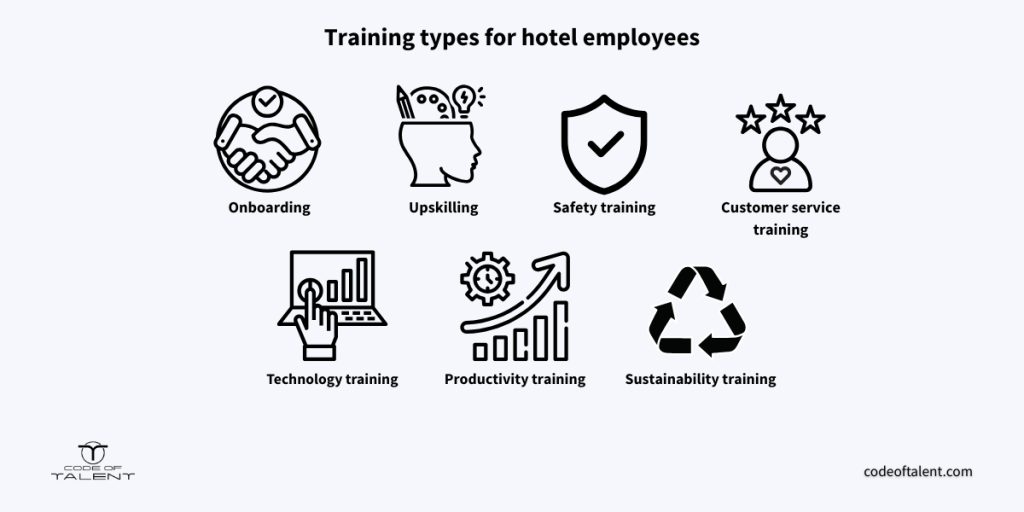
Initial Onboarding and Orientation
This covers the basics: hotel layout, brand values, and team introductions. New hires should be shown how their role fits into the larger operation.
Example: During onboarding, a new housekeeper learns not just the cleaning checklist but also how to report maintenance issues to prevent guest complaints later.
Soft Skills Development
Soft skills are essential in the hotel industry because they shape how employees interact with guests and each other. These skills include:
- Communication techniques
- Emotional intelligence
- Customer service
Example: Role-playing a scenario where a guest requests a room that’s unavailable allows staff to practice staying calm, showing empathy, and offering alternative solutions, all in a safe training environment.
Safety and Security Procedures
Guests and staff safety (both physical and digital) should be a priority in hotel staff training. Safety and security procedures training should cover:
- Fire safety protocols, including knowing emergency exits and how to use fire extinguishers
- Basic CPR and first aid procedures
- Earthquake and other natural disaster safety responses
- How to recognize and respond to suspicious behavior or potential threats
- Procedures for handling theft, including reporting and evidence preservation
- How to respond to assault or harassment incidents
- Handling sensitive information securely to comply with privacy laws like GDPR
- Hygiene and sanitation rules to prevent illness and maintain a safe environment
Example: Conducting regular fire drills helps employees practice safe evacuation procedures.
Customer Service
Customer service training builds on professionalism, empathy, and problem-solving. This can include learning how to anticipate guest needs, personalize interactions, and recover service after a mistake.
Example: Role-playing scenarios, such as managing a guest upset about a delayed check-in, help employees practice staying calm and offering solutions.
Technology Training
Modern hotels rely on property management systems (PMS), point-of-sale software, and digital check-in tools. Without training, staff may underuse or misuse these systems, slowing service.
Example: A practical exercise could involve mock reservations so staff can navigate the PMS with confidence before using it with guests.
Productivity Training
Productivity training focuses on task prioritization and efficiency. Every role sees productivity differently, so training needs to be adapted according to role and responsibility.
Example: This could mean teaching housekeeping teams to follow a route that reduces backtracking, or showing front desk staff how to handle multiple guest requests without long waits.
Sustainability Training
According to Booking.com, 61% of travelers say the pandemic made them want to travel more sustainably, with waste reduction a top priority after recycling. Sustainability training can include reducing single-use plastics, managing water usage, and recycling correctly.
Example: Housekeeping staff might be trained to replace towels only when guests request it, cutting water and detergent use.
Tailoring Training by Role: Front Desk, Housekeeping, and Beyond
Each hotel role has distinct responsibilities, so training should focus on the skills that matter most for day-to-day success and guest satisfaction.
Front Desk
Front desk staff are the face of the hotel, the first people guests interact with. One failed interaction and the entire experience can be compromised.
This is why training for front desk should focus on:
- Check-in and check-out procedures
- Reservation management
- Handling guest inquiries professionally
- Using the PMS for bookings and payments
- Handling busy or challenging situations
Housekeeping
Housekeeping teams must maintain high cleanliness standards while working safely. Training for them includes:
- Room cleaning standards and quality control
- Safety protocols and proper use of cleaning supplies
- Responding to guest requests promptly
- Handling lost and found items
Food and Beverage
Food and beverage employees are key to guest satisfaction through safe food handling and attentive service. Training covers:
- Food safety and hygiene standards
- Service protocols and etiquette
- Customer interaction and upselling techniques
- Detailed menu knowledge, including ingredients and dietary options.
- Download our Menu Knowledge Checklist to help your team stay informed and updated on all things menu related.
Sales and Marketing
Hotel staff are more than just frontline service workers. Sales and marketing employees play a vital role by bringing in clients, showcasing the brand’s offerings, and driving revenue growth. Training emphasizes:
- Promoting hotel services and amenities
- Upselling strategies to increase revenue
- Managing customer inquiries effectively
- Understanding guest needs and tailoring offers
Management
In a hotel setting, managers need to lead teams, manage resources, and ensure operational excellence while supporting staff and guests. Training targets:
- Leadership and team motivation
- Conflict resolution and communication skills
- Staff scheduling and resource management
- Budgeting and financial oversight
- Ensuring policy compliance and quality standards
Examples of Training Topics
Different training methods help meet the unique challenges of hotel staff training. Here’s a closer look at each type:
Role-playing
What it is: Role-playing involves acting out realistic scenarios employees may face on the job.
How it works: Staff take turns playing both the employee and guest roles to practice communication, problem-solving, and service skills.
Example of training: One employee plays the role of a receptionist, while the other is a guest upset about a noisy room. They work to solve the problem from their roles, then switch positions. This helps employees understand the guest’s frustration (improving empathy) and practice calming and resolving tense situations.
Case studies
What it is: Case studies analyze specific incidents or challenges that have occurred in hospitality settings.
How it works: Employees review the situation, identify what went wrong or right, and discuss solutions or alternative approaches.
Example of training: A team examines a case where a hotel experienced a data breach exposing guest information. They analyze the causes, review how the breach was handled, and discuss measures to improve data security.
On-the-job training
What it is: Learning through hands-on work experience under supervision.
How it works: New employees shadow experienced staff or perform tasks with guidance, learning through doing.
Example of training: A new housekeeper works alongside a senior team member, gaining confidence through real-time feedback.
Seminars and Webinars
What it is: Group learning sessions, either in person or online, covering specific topics.
How it works: Trainers present information, often with Q&A, discussions, and multimedia support.
Example of training: A webinar on new hygiene regulations explains updated cleaning protocols and gives employees a chance to ask questions.
Mentoring
What it is: One-on-one guidance from an experienced employee to a newer staff member.
How it works: Mentors offer advice, feedback, and support, helping mentees develop skills and navigate the workplace.
Example of training: Pairing a front desk trainee with a veteran receptionist who coaches them on handling guest interactions and system use.
Videos
What it is: Visual training materials that demonstrate procedures or concepts.
How it works: Employees watch instructional videos, which can be paused and rewatched to ensure understanding.
Example of training: A video showing step-by-step room cleaning techniques or proper use of safety equipment.
Gamification
What it is: Applying game elements like points, badges, and quizzes to online training content.
How it works: Employees complete challenges and earn rewards, making learning fun and motivating.
Example of training: A compliance-focused training program where employees earn points and medals for completing training missions quickly. Those with the highest scores move up the leaderboard, encouraging friendly competition and faster learning.
Microlearning
What it is: Short, focused training modules targeting specific skills or knowledge areas.
How it works: Staff complete quick lessons, often via mobile devices, fitting training into busy schedules.
Example of training: A 5-minute microlearning module on handling guest complaints or a brief refresher on hygiene protocols.
Conclusion
Hotel staff training is key to maintaining smooth operations and delivering excellent guest experiences. Using a variety of training methods tailored to different roles keeps learning engaging and effective, helping employees build confidence and skills.
Code of Talent is a training platform well-suited for the hotel industry because it:
- Offers interactive, multimedia content that keeps staff engaged
- Includes gamification to motivate learning through points, badges, and leaderboards
- Supports microlearning, allowing quick training sessions that fit busy schedules
- Enables easy customization to tailor training for different hotel roles
- Provides analytics to track progress and identify knowledge gaps
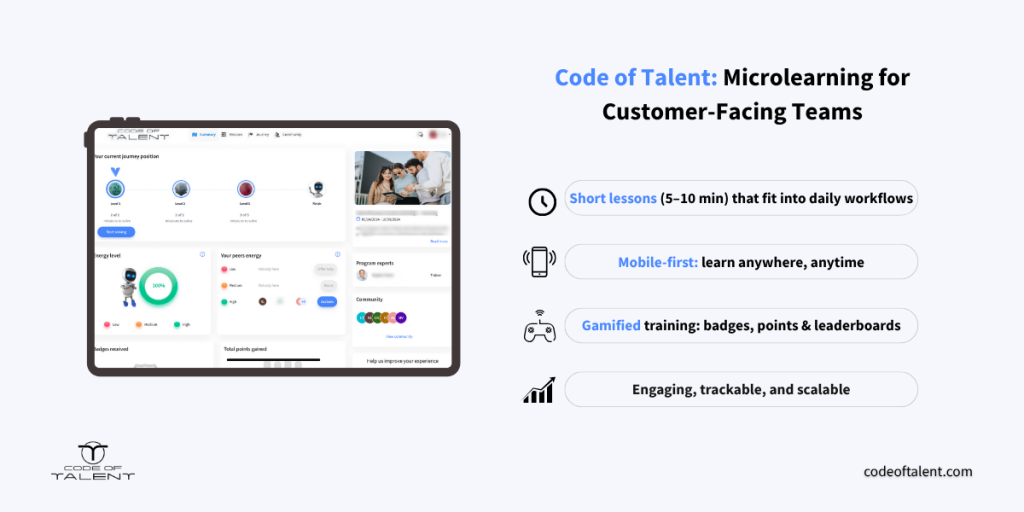
Try Code of Talent’s free trial today to access hotel staff training tools that boost your team’s skills and productivity!
Cover photo: Freepik

